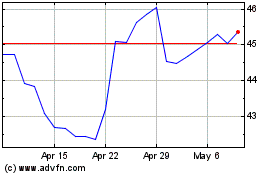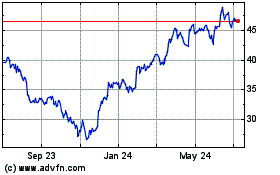GM-UAW Contract Talks Turn Focus to Wages -- Update
October 08 2019 - 4:29PM
Dow Jones News
By Mike Colias and Nora Naughton
General Motors Co. and the United Auto Workers are down to a
crucial topic at the bargaining table: wages.
The UAW is pressing GM to lock in more guaranteed wage increases
for members during the next four-year labor contact, while company
bargainers want to give workers more pay in the form of lump-sum
bonuses that don't raise their long-term labor costs, said people
close to the talks.
Reaching a resolution on this topic is one of the few remaining
obstacles, these people said, to getting a new tentative labor pact
for the company's 46,000 full-time factory workers and ending a
23-day strike that has brought GM's U.S. factories to a
standstill.
The conflict over how to increase factory-worker pay is
especially intense in this round of talks, with both sides wary of
a possible cooling in the U.S. car market and looking to secure
terms on pay for the next four years. U.S. auto sales remain
healthy after a record stretch, but have historically been prone to
sharp downturns.
The Detroit auto maker, the U.S.'s largest by sales, has said
publicly that it wants to better compensate its union-represented
workers. But the negotiations are now centered on how much of that
comes in the form of a permanent pay increase versus lump-sum
bonuses that would be paid out only in the years promised, the
people said.
Under the current UAW contact, full-time factory workers at GM
start at roughly $17 an hour and top out at roughly $30 an hour
after eight years.
Bargainers returned to negotiations this week, after contract
talks hit a snag on Sunday when the UAW's top bargainer for GM,
Terry Dittes, publicly lashed out at the company and claimed talks
had "taken a turn for the worse."
GM returned Monday with another contract proposal and the sides
have made progress on crucial issues, including how fast new hires
can reach top pay, the people close to the talks said. Negotiators
have largely settled several other contentious issues, including
health care and a path to full-time status for temporary workers,
the people said.
The strike, the longest nationwide walkout at GM since 1970, is
taking a toll on both sides. The lost production from idling more
than 30 U.S. plants has hit GM's bottom line by more than $1
billion, analysts estimate, and disrupted the launch of a lucrative
line of redesigned pickup trucks.
Meanwhile, UAW workers aren't drawing company paychecks, and are
getting by on $250 weekly checks from the union, a fraction of
their normal pay.
The showdown over wages is typically a core tension during talks
and one of the last items to be settled, analysts said.
"It's the battle royal," said Kristin Dziczek, an economist and
labor expert at the Center for Automotive Research.
GM wants to build in more flexibility through paying one-time
bonuses, so it can compensate workers when profits are healthy but
not get stuck with higher labor costs during a sales downturn, Ms.
Dziczek said.
The union wants the opposite, assurances its members will
improve their wages and have income security through an uncertain
period, she added.
"Base-wage increases increase the cost of vacation pay, sick
pay, overtime," Ms. Dziczek said. "There are a lot of other things
that go up automatically with that."
Each of the past two contracts has included a combination of
wage increases and lump-sum payouts. For example, the agreement
that expired last month included a 3% wage increase in the first
and third years, and lump-sum payouts in the second and fourth
years. That let GM avoid raising workers' base wages in those
years.
The wages set in the GM contract will have implications for Ford
Motor Co. and Fiat Chrysler Automobiles NV because, as is typical
in pattern bargaining, the GM talks will set a template for
contract talks with the other two U.S. car companies.
In addition to wages, negotiators continue to discuss pay for
less-tenured workers, retirement benefits and the amount of a
contract signing bonus that each worker would receive upon
ratifying the new labor pact.
Under the expired contract, workers hired more recently must
work eight years before reaching the top wage. The union wants to
compress that timetable, while GM has resisted, the people familiar
with the talks said. Bargainers have come closer to a compromise in
recent days, the people said, without providing details.
(END) Dow Jones Newswires
October 08, 2019 16:14 ET (20:14 GMT)
Copyright (c) 2019 Dow Jones & Company, Inc.
General Motors (NYSE:GM)
Historical Stock Chart
From Mar 2024 to Apr 2024

General Motors (NYSE:GM)
Historical Stock Chart
From Apr 2023 to Apr 2024
